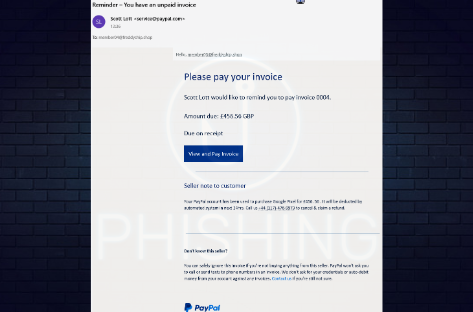Phishing scams are something you’ll be more aware of if you spend a lot of time online, working in an office or in the technology industry. Although, this isn’t always true.
Of course, phishing scams and online security, both personal and business, a topic that has become more prevalent in recent years, as more and more businesses report data breaches.
Over time, phishing scams and scammers, just like technology, develop to become more sophisticated and more real. You only have to look around at the talk about AI and things like ChatGPT.
The more real it is, the more likely you are to interact with it.
Back at the birth of the internet, with the first glimpses of what benefits it could bring and the internet was a fluffy and safe place to be, were there scammers about then?
Yes, there was but, like early internet technology, such as dial-up modems and early websites, they were rudimentary. When compared with today’s superfast fibre and slick mobile apps.
So, as digital and mobile technology has developed, so have phishing scams, scammers and their methods.
Again, if you have been involved in spending a lot of time online, working in an office or in the technology industry, you would, more than likely, be more aware of these changes and developments.
So, when I see a scam like this drop into my inbox, not just one email but five emails, sent over an hour or so period. You can see how this phishing scam, to an untrained eye or less technically minded person, could easily trick someone into clicking on the link.
Thereby surrendering their PayPal, bank details or other personal details the scammer is after.
Usually, this would be done in a state of shock as you try to wonder who had spent almost £500 on your PayPal account and by the time you realise it’s a scam, it’s too late.
This then turns into a damage limitation exercise.
A Cautionary Tale about Phishing Scams
I once stood with the financial controller of a business I worked at, while we both watched the company’s bank account being syphoned of money one Friday afternoon. This had been the result of a phishing scam that one of the finance team had unwittingly fallen for.
Did they get the money back?
Luckily they did but it took months of phone calls and emails to sort out, which had to be done during work hours. Not really what you want your staff to be doing when they have a job to do.
Following this incident, the company doubled down on its email security, investing in a spam filter for its mail server, training the staff on how to spot fraudulent emails and the reviewed their processes within the finance team.
So, back to this PayPal phishing scam.
It is easy to see how people are tricked, especially looking at this scam.
It appears to be, for all intents and purposes, from PayPal.
Even to a trained eye like mine, with 30 years of experience, it made me look twice.
So, what can you do to protect yourself from scams?
On a personal level. Basics
On a business level. Basics
The PayPal phishing scam I received got through Microsoft’s own spam filter for my Hotmail (Outlook) account and ended up in my inbox. It had been flagged safe. If that had been to my work email, it probably wouldn’t and if it did, it would have been flagged as spam.
It is hard to know how to detect digital fraud if you’re never shown how to.
127 Media can provide digital consultancy to small to medium-sized businesses that would like to know more about how they can protect their business and staff from digital fraudsters.
We can also help protect your staff, with our spam management solution.
Since I began writing this, I have had five emails from the same source over a 60-minute period. Illustrating how determined they are, if nothing else!
When you consider that phishing scams are the most common form of digital fraud, with an estimated 3.4 billion spam emails sent worldwide every day.
That’s every single day! Every day of the year!
There is no wonder that some people are going to get scammed. It’s just a number game.
Even if a very small percentage of phishing scams are successful for the scammer, the rewards can still be great.
Don’t become another statistic!
This content was originally published here.




